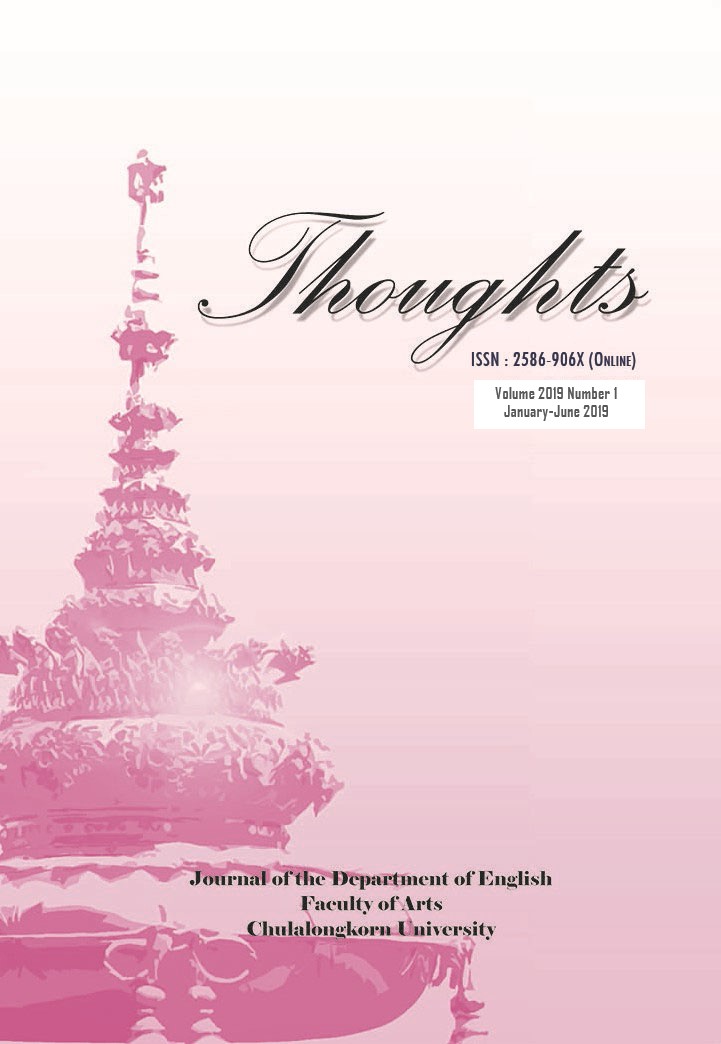Hedges and Boosters in US College Application Essays
A Corpus-Based Comparative Study between the US Middle and the US top College Application Essays
Keywords:
hedges, boosters, corpus-based study, college application essay, epistemic modalityAbstract
The present study examines the use of hedges and boosters in college application essays written by Thai students who were accepted into the US middle colleges and international students who were accepted into The US top colleges. The hedges and boosters that express epistemic modality are the main focus as writers’ attitudes are critical in college application essays. Concordancing was used to search for epistemic hedges and boosters which were analyzed according to Hyland’s taxonomy of forms and functions. More tentative expression was used than confident prediction in the US middle college application essays, as hedges were employed more frequently in the US middle than in the US top college application essays. Epistemic hedges in college application essays were found to express probability or display writers’ uncertainty, while epistemic boosters were employed as a certainty marker. Certain forms and functions as well as grammatical environments of hedges and boosters determined whether they convey epistemic modality.
References
Chen, Z. (2012). Expression of Epistemic Stance in EFL Chinese University Students’ Writing. English Language Teaching, 5(10), 173-179. Retrieved from https://files.eric.ed.gov/fulltext/EJ1079793.pdf
Coates, J. (1983). The Semantics of the Modal Auxiliaries. Beckenham: Croom Helm.
Coates, J. (1987). Epistemic Modality and Spoken Discourse. Transactions of the Philological Society, 85(1), 101-131. doi:10.1111/j.1467-968X.1987.tb00714.x
Coates, J. (1995). The Expression of Root and Epistemic Possibility in English. In J. Bybee, & S. Fleischman (Eds.), Modality in Grammar and Discourse (pp. 55–56). Amsterdam: John Benjamins Publishing Company.
Crismore, A., & Farnsworth, R. (1990). Metadiscourse in Popular and Professional Science Discourse. In W. Nash (Ed.), The Writing Scholar: Studies in Academic Discourse (pp. 118-136). Newbury Park, CA: Sage.
Getkham, K. (2016). Authorial Stance in Thai Students’ Doctoral Dissertation. English Language Teaching, 9(3), 80-95. doi:10.5539/elt.v9n3p80
Grabe, W., & Kaplan, R. (1997). On the Writing of Science and the Science of Writing: Hedging in Science Text and Elsewhere. In R. Markkanen & H. Schröder (Eds.), Hedging and Discourse: Approaches to the Analysis of a Pragmatic Phenomenon in Academic Texts (pp. 3–18). Berlin: Walter de Gruyter.
HE, Yi. (2017). Really Good or Real Good? A Corpus-Based Approach to the Grammaticalization and Delexicalization of Real. Thoughts, 2017(2), 1-20. Retrieved from https://www.tci-thaijo.org/index.php/thoughts/article/download/107969/85463
Hu, C., & Li, X. (2015). Epistemic Modality in the Argumentative Essays of Chinese EFL Learners. English Language Teaching, 8(6), 20-30. doi:10.5539/elt.v8n6p20
Huddleston, R. (1971). The Sentence in Written English: A Syntactic Study Based on an Analysis of Scientific Texts. New York: Cambridge University Press.
Hyland, K. (1998a). Boosting, Hedging and the Negotiation of Academic Knowledge. Interdisciplinary Journal for the Study of Discourse, 18(3), 349–382. doi:10.1515/text.1.1998.18.3.349
Hyland, K. (1998b). Hedging in Scientific Research Articles. Amsterdam: John Benjamins Publishing.
Hyland, K. (2002). Authority and Invisibility: Authorial Identity in Academic Writing. Journal of Pragmatics, 34(8), 1091-1112. doi:10.1016/S0378-2166(02)00035-8
Hyland, K. (2005). Metadiscourse: Exploring Interaction in Writing. London: Continuum.
Hyland, K., & Milton, J. (1997). Qualification and Certainty in L1 and L2 Students’ Writing. Journal of Second Language Writing, 6(2), 183-205. Retrieved from https://citeseerx.ist.psu.edu/viewdoc/download? doi=10.1.1.469.8770&rep=rep1&type=pdf
Hyland, K., & Tse, P. (2004). Metadiscourse in Academic Writing: A Reappraisal. Applied Linguistics, 25(2), 156-177. doi:10.1093/applin/25.2.156
Institute for Broadening Participation. (2016). Writing strong essays and personal statements. Retrieved from https://www.pathwaystoscience.org/pdf/Applying_WritingEssaysAndPersonalStatements.pdf
Ivy Global. (2018). Ivy Global College Guide. Retrieved from https://downloads.ivyglobal.com/sat/courses/IvyGlobal_CollegeGuide.pdf
Leech, G. (1999). Semantics: The Study of Meaning. London: Penguin.
Markkanen, R., & Schröder, H. (1997). Hedging: A Challenge for Pragmatics and Discourse Analysis. In R. Markkanen & Schröder (Eds.), Hedging and Discourse: Approaches to the Analysis of a Pragmatic Phenomenon in Academic Texts (pp. 3-18). Berlin: Walter de Gruyter.
McGinty, S. M. (1995). In the Space Provide: The College Application Essay. The English Journal, 84(3), 70-72. Retrieved from https://links.jstor.org/sici?sici=0013-8274%28199503%2984%3A3%3C70%3AITSPTC%3E2.0.CO%3B2-P
Milton, J., & Hyland, K. (1999). Assertions in Students’ Academic Essays: A Comparison of L1 and L2 Writers. In R. Berry, B. Asker, K. Hyland, & M. Lam (Eds.), Language Analysis, Description and Pedagogy (pp. 147-161). Hong Kong: HKUST.
Palmer, F. (1990). Modality and the English Modals. (2nd ed.). London: Longman.
Palmer, F. (2007). Mood and Modality. Cambridge: Cambridge University Press.
Salager–Meyer, F. (1994). Hedges and Textual Communicative Function in Medical English Written Discourse. English for Special Purposes, 13(2), 149–171. Retrieved from https://citeseerx.ist.psu.edu/viewdoc/download; jsessionid=1A8A7070526841720446CBE48BE5B430?doi=10.1.1.566.2410&rep=rep1&type=pdf
Siribud, S. (2016). Authorial Stances in Classroom Speeches: A Corpus-Based Study. PASAA PARITAT, 31, 141-162. Retrieved from https://www.culi.chula.ac.th/publicationsonline/files/article2/BGBc72ZyDIThu24151.pdf
Sukhanindr, M. (2008). Hedging in Research Articles about English Language Teaching Written by Thai and Native Speakers of English. Kasetsart Journal of Humanities, 16(2), 109-120. Retrieved from https://www.tci-thaijo.org/index.php/abc/article/view/54445
Takimoto, M. (2015). A Corpus-Based Analysis of Hedges and Boosters in English Academic Articles. Indonesian Journal of Applied Linguistics, 5(1), 95–105. doi:10.17509/ijal.v5i1.836.
Tanabe, G., & Tanabe, K. (2009). 50 Successful Ivy League Application Essays. California: SuperCollege.
The Common Application. (2009). 2008-09 First-Year Application. Retrieved from https://www.4089962002.com/sitebuildercontent/sitebuilderfiles/ commonapp2008_09.pdf
Varttala, T. A. (2001). Hedging in Scientifically Oriented Discourse: Exploring Variation According to Discipline and Intended Audience (Ph.D. dissertation, University of Tampereen Yliopisto). Retrieved from https://tampub.uta.fi/bitstream/handle/10024/67148/951-44-5195- 3.pdf?sequence=1
Worawanna Petchkit. (2016). Hedges in Research Articles Written in English and Writing Problems of Non-Native Writers. Journal of Humanities, Naresuan University, 12(3), 45-51. Retrieved from www.human.nu.ac.th/jhnu/file/journal/2016_08_19_10_45_51-05%20.pdf
Downloads
Published
Issue
Section
License
Copyright by the Faculty of Arts, Chulalongkorn University.
Photocopying is allowed for internal, non-commercial use only. Photocopying for other uses or for purposes other than indicated must be permitted in writing from the Faculty of Arts, Chulalongkorn University.
All views or conclusion are those of the authors of the articles and not necessarily those of the publisher or the editorial staff.


